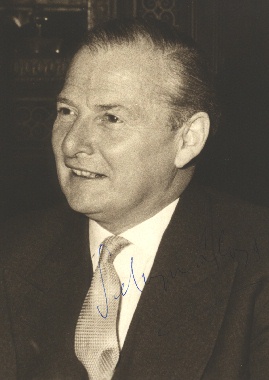Selwyn Lloyd
 | |
| Born |
July 28, 1904 West Kirby, United Kingdom |
|---|---|
| Died |
May 18, 1978 (aged 73) Oxfordshire, United Kingdom |
Few could have predicted that Selwyn Lloyd would be the author of dramatic change in British media. He had only recently entered Parliament as a Conservative, having been an unremarkable lawyer and a mid-ranking Army officer in the war. He had little by way of an ideological track record, the only exception being that he had resigned from the Liberal Party in 1931 over its abandonment of free trade. But on being appointed to the Beveridge Committee Lloyd visited the United States to experience broadcasting there, and came back impressed. The experience proved to him that a cultural counterpart to Gresham's Law was not nearly the threat that the BBC's supporters suggested. This being so, he became determined that Parliament should end "at any reasonable cost" what he accounted a "perpetual monopoly in the provision of information, education, and entertainment. He denounced in rather eloquent, if conventional, terms the "terrifying" dangers implicit in the notion of a public corporation with a mandate to elevate the general culture. After all, nobody would advocate a single "British Publishing Corporation" to control the production of books. Lloyd proposed commercial television and radio channels to run alongside the BBC's surviving stations, with a counterpart to America's FCC (Federal Communications Commission) to oversee them all.
At first, few took note of Lloyd's dissent. But its plausibility waxed as the vitality of the Labour government wilted under Austerity. With the fear of interference receding in the face of new VHF and television technologies, and with Ronald Coase's pointed analysis finding readers, questions of principle now came to the fore. By the time the Conservatives returned to power in October 1951, Lloyd's position had acquired a reputation among Tory backbenchers as a powerful and principled statement—one "firmly based upon the very foundations of Conservative philosophy," as MP Gilbert Longden put it." Lloyd found himself with supporters both at Westminster and, quietly but powerfully, in the advertising industry. They launched an intense lobbying effort—one of the first in modern British politics. Its strength unsettled even Churchill's Cabinet, which was filled with older grandees who liked the BBC and had not recognized the potency of the issue for the party's Young Turks. The Turks' initial target was not radio, however, the regime for which was entrenched. Their target was television.
After nutch parliamentary in the bill permitting commercial television passed at the end of July 1954. The first actual broadcasts went out just over a year later. In the meantime, Lloyd's position had exposed him to attack, not least from his own constituents. They regularly wrote to him to threaten that they would vote "socialist" if he masterminded the introduction of commercial media. The correspondence (relatively little of which supported his stance) reveals much about attitudes to the public service at this critical juncture. A Professor Hearnshaw, for example, calling himself "an educator who is much concerned with the evil effects of commercial influences on growing minds," mid who claimed to have lived in a country where commercial broadcasting reigned, declared himself "absolutely opposed to allowing commercial interests to control any form of broadcasting." A headmaster from Anglesey urged that there could be no real choice when "the sole criterion of content is the breadth of popular appeal," and contrasted the "delicate subtleties of humour" of the BBC: with the "ranting roaring commercialism" of American stations. Another constituent added that slogans about freedom on the air were sure to prove "illusory" when it came to television, because the large capital required to establish a 'EV station meant that in practice access would be limited to the few. And a fruit merchant in Liverpool lamented I hat Lloyd's proposal for commercial broadcasting—or, as he put it, his plan to "prostitute television"—would "lower still further the general standard of intelligence and of selectivity. Lloyd was civil to these citizens, and occasionally conceded that a correspondent had a point. But he held his ground, robustly declaring that he meant to vote against the monopoly just as he would against a single Institution to publish all newspapers, or to run all theaters, or to publish all books. To leave broadcasting in the hands of a single institution would "endanger the freedom of our whole society." In what seems to have been at unsent draft, he added that "many millions" had already listened for years to Radio Luxembourg with no ill effects, exposing themselves to commercial broadcasting over which the British state had no control at all.
By the mid-1950s, then, Coase's argument had become pivotal to creating a commercial television service in rivalry to the BBC. It also provided what would remain the principal foundation—typically quoted verbatim but without acknowledgment—for defenses of pirate radio into the 1960s. The clash over broadcasting set in train at the LSE in the 1930s extended in this way through the forties and fifties, and on into the sixties. It was seen by all sides now as a conflict about culture itself—its definition, character, quality, and future. Indeed, it became a central battleground in the conflicts over high and low—or elite and mass—culture inaugurated by the Leavises before the war and given new force a generation later by Richard Hoggart and others.[1]
Notes
- ↑ Johns, Adrian (2010). Death of a Pirate: British Radio and the Making of the Information Age. W. W. Norton & Company, pp 99-102.